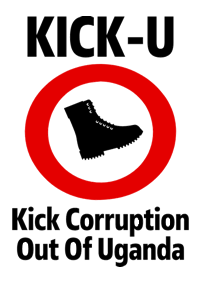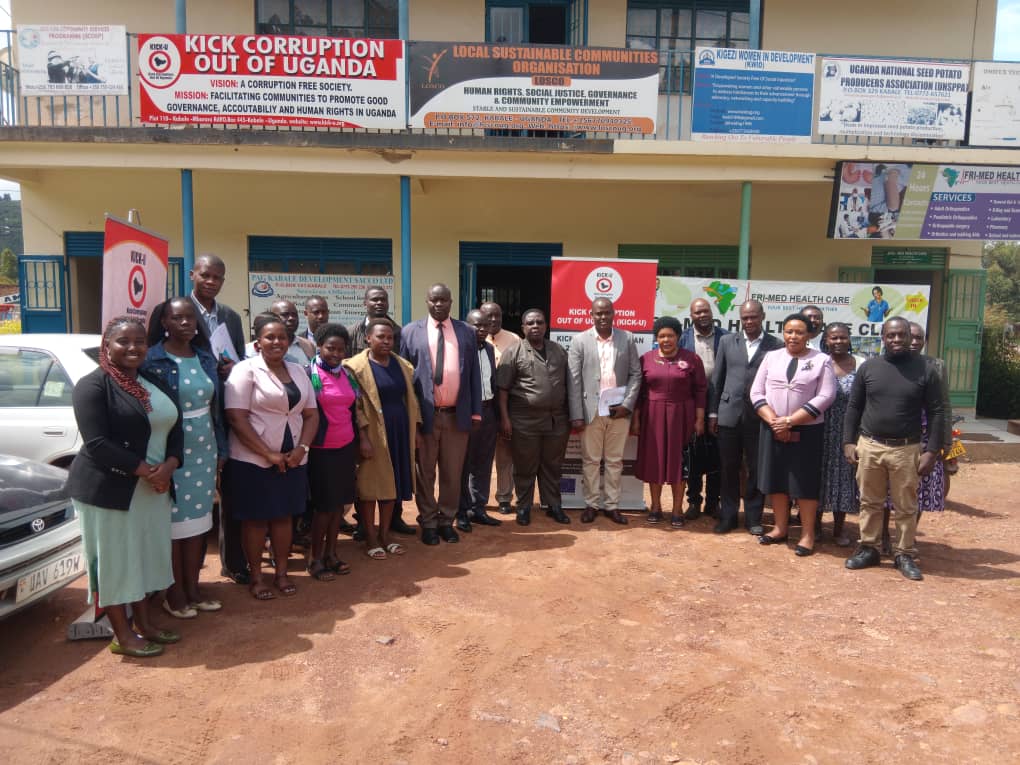
In a bold step to strengthen coordination and improve service delivery, Kick Corruption out of Uganda (KICK-U), in partnership with the Directorate for Ethics and Integrity, hosted a high-level stakeholder engagement meeting under the framework of the District Integrity Promotion Forum (DIPF). The event, held on Thursday, April 3, 2025, at the KICK-U offices in Kabale Municipality, brought together key district leaders and Anti-Corruption champions committed to upholding Transparency, Accountability, and good Governance in Public Service.
This strategic engagement aligns with Uganda’s Zero Tolerance to Corruption Policy, which was accented to by the President to reignite the national fight against Corruption and reinforce the National Anti-Corruption Strategy (NACS). The policy envisions a Uganda where public resources are used efficiently and effectively to foster socio-economic transformation from a peasant-based to a middle-income economy.
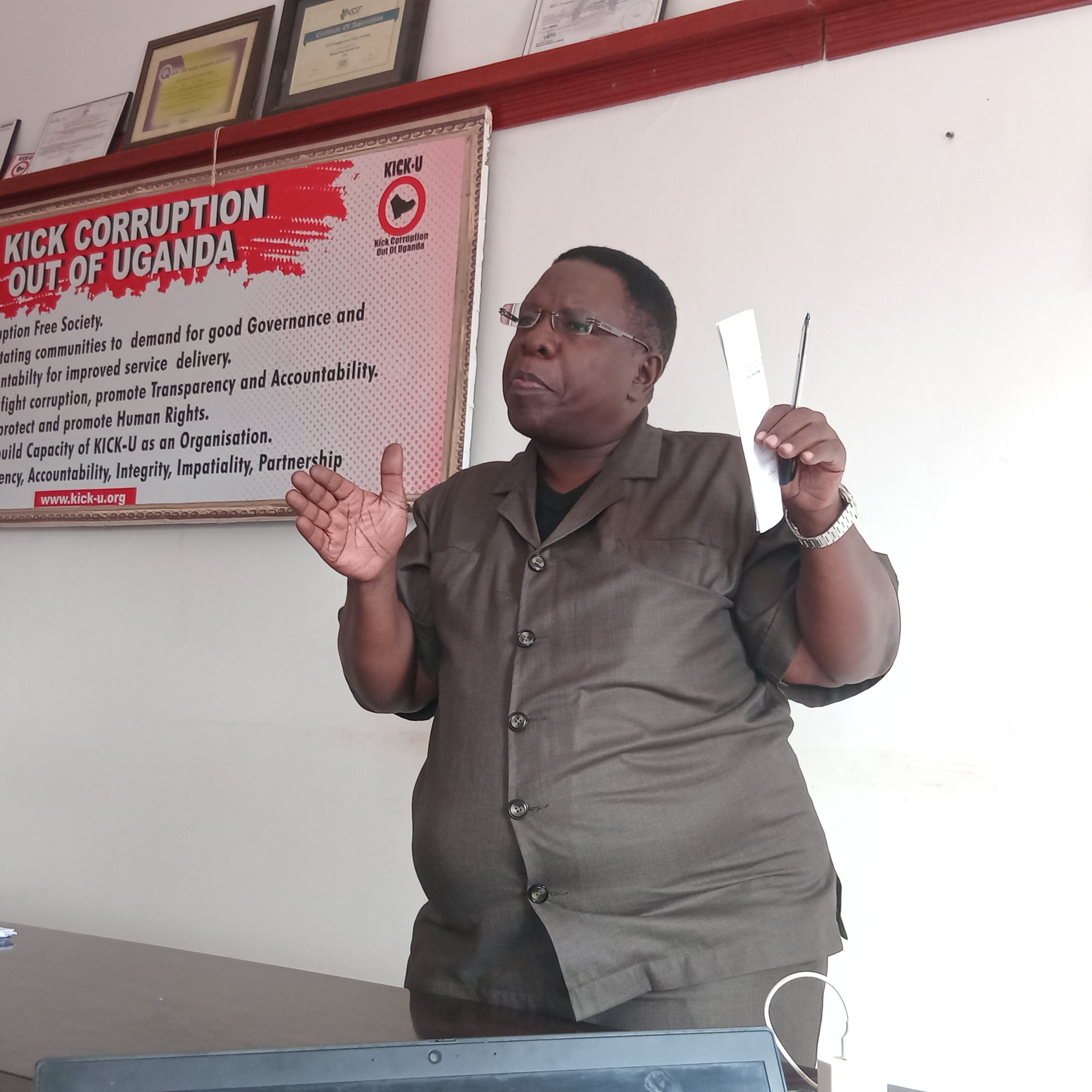 In his opening remarks, Moses Makumbi, Commissioner for Ethics and Integrity, emphasized the urgent need to coordinate efforts across all levels of Governance to uproot Corruption.“The war against Corruption requires unity, strategic coordination, and Moral uprightness. The Parish Development Model must benefit ordinary Ugandans without interest attached to the funds. Citizens must understand these programs and use them to improve their lives,” Makumbi stated.
In his opening remarks, Moses Makumbi, Commissioner for Ethics and Integrity, emphasized the urgent need to coordinate efforts across all levels of Governance to uproot Corruption.“The war against Corruption requires unity, strategic coordination, and Moral uprightness. The Parish Development Model must benefit ordinary Ugandans without interest attached to the funds. Citizens must understand these programs and use them to improve their lives,” Makumbi stated.
Makumbi also raised concerns about the decline in ethical values, emphasizing that corruption is not just about financial misconduct but also about the erosion of Integrity in society. “Corruption doesn’t just start with money, it starts with values. Our Youth must rise up and fight against both moral decay and corruption to build a better Uganda,” he said, calling on citizens to report Corruption and support organizations like KICK-U in their anti-corruption work.
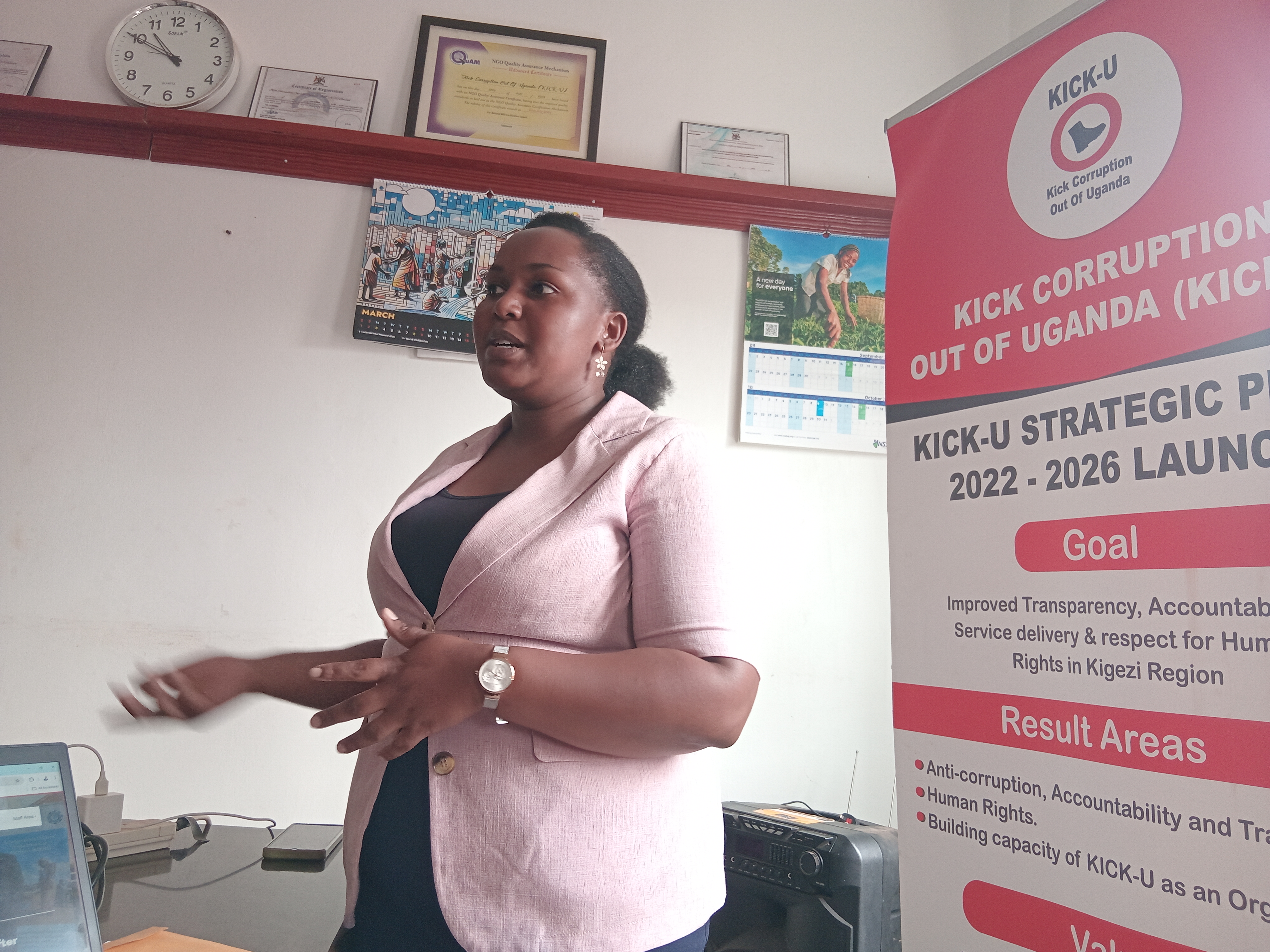 Annitah Ninsiima, Program Officer at KICK-U, highlighted some of the on-the-ground challenges the organization faces while fighting Corruption. “Our Community Monitors lack smartphones and internet data, making it difficult to report Corruption cases in real time. There are also gaps in contract information that hinder Transparency and Accountability,” Ninsiima explained.
Annitah Ninsiima, Program Officer at KICK-U, highlighted some of the on-the-ground challenges the organization faces while fighting Corruption. “Our Community Monitors lack smartphones and internet data, making it difficult to report Corruption cases in real time. There are also gaps in contract information that hinder Transparency and Accountability,” Ninsiima explained.
She called for increased support from both government and partners to strengthen grassroots monitoring mechanisms, including access to ICT tools and reliable internet services.
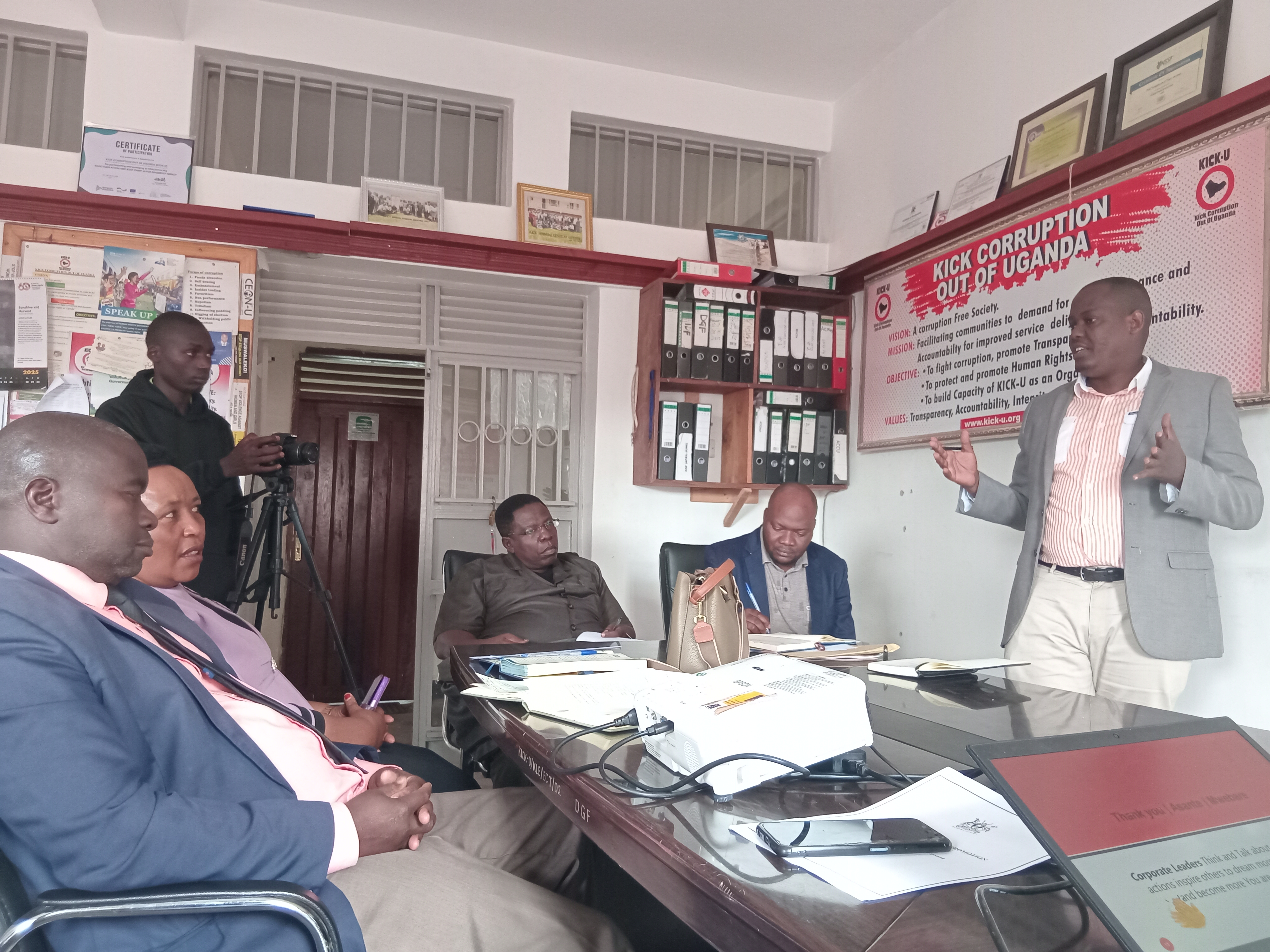 Representing the Office of the President, Assistant Resident District Commissioner (RDC) of Kabale District, Niwataho Martin, lauded KICK-U for its proactive approach to community empowerment. He urged the organization to deepen its field presence beyond office-based operations. “Don’t wait for information to come to you, go and get it from the Villages, Parishes, and Sub-Counties. Organize community meetings like Baraza and conferences so that people can raise their issues directly,” Niwataho advised.
Representing the Office of the President, Assistant Resident District Commissioner (RDC) of Kabale District, Niwataho Martin, lauded KICK-U for its proactive approach to community empowerment. He urged the organization to deepen its field presence beyond office-based operations. “Don’t wait for information to come to you, go and get it from the Villages, Parishes, and Sub-Counties. Organize community meetings like Baraza and conferences so that people can raise their issues directly,” Niwataho advised.
He reiterated the importance of ensuring that public officials are accountable to the people they serve, adding: “Transparency and accountability are not optional, they are fundamental pillars in the fight against corruption.”
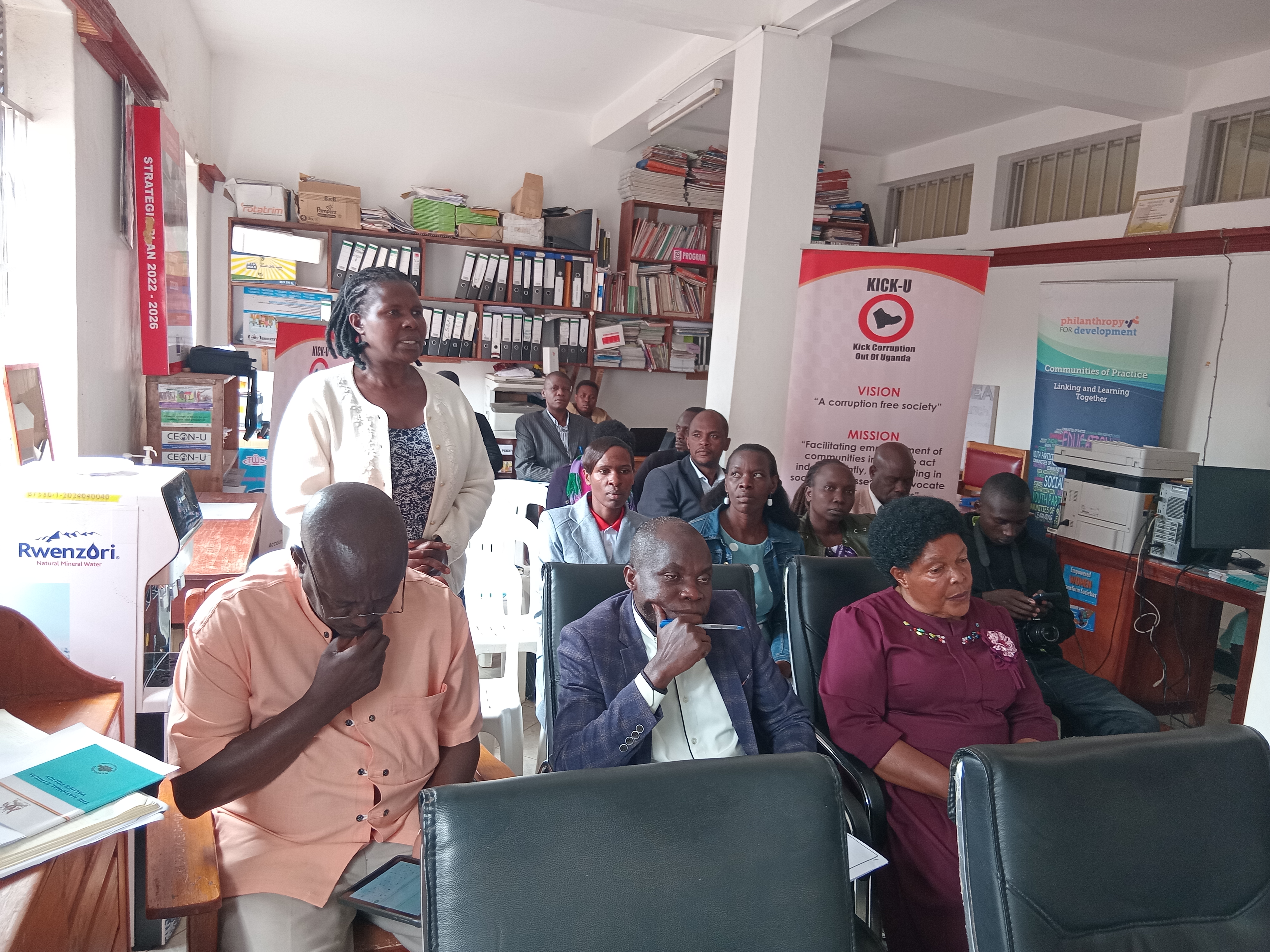 Over 25 participants including; KICK-U Community Monitors, Civil Society Organizations (CSOs), Media, Board Members, Religious Leaders, Political Leaders, Civil Servants, KICK-U Staff, were also in attendance and expressed their commitment to championing Anti-Corruption efforts through Local Government Structures and Partnerships. The stakeholder meeting underscored the critical role of forums like the DIPF in bridging communication gaps between Citizens and Government, enhancing Collaboration, and Monitoring Public Service Delivery more effectively.
Over 25 participants including; KICK-U Community Monitors, Civil Society Organizations (CSOs), Media, Board Members, Religious Leaders, Political Leaders, Civil Servants, KICK-U Staff, were also in attendance and expressed their commitment to championing Anti-Corruption efforts through Local Government Structures and Partnerships. The stakeholder meeting underscored the critical role of forums like the DIPF in bridging communication gaps between Citizens and Government, enhancing Collaboration, and Monitoring Public Service Delivery more effectively.
As an organization, KICK-U reaffirmed its commitment to its mission; “Facillitating Communities to Demand for good Governance and Accountability for improved Service Delvery.” The organization continues to advocate for Integrity, Impartiality, and the effective use of public resources in Uganda. “A corruption-Free Society is not a dream; it is a goal we must collectively work toward,” concluded Ninsiima.
This engagement marks yet another milestone in the national Anti-Corruption movement and a clear demonstration that when Citizens, Civil Society, and Government unite, Integrity and Justice can indeed prevail.
